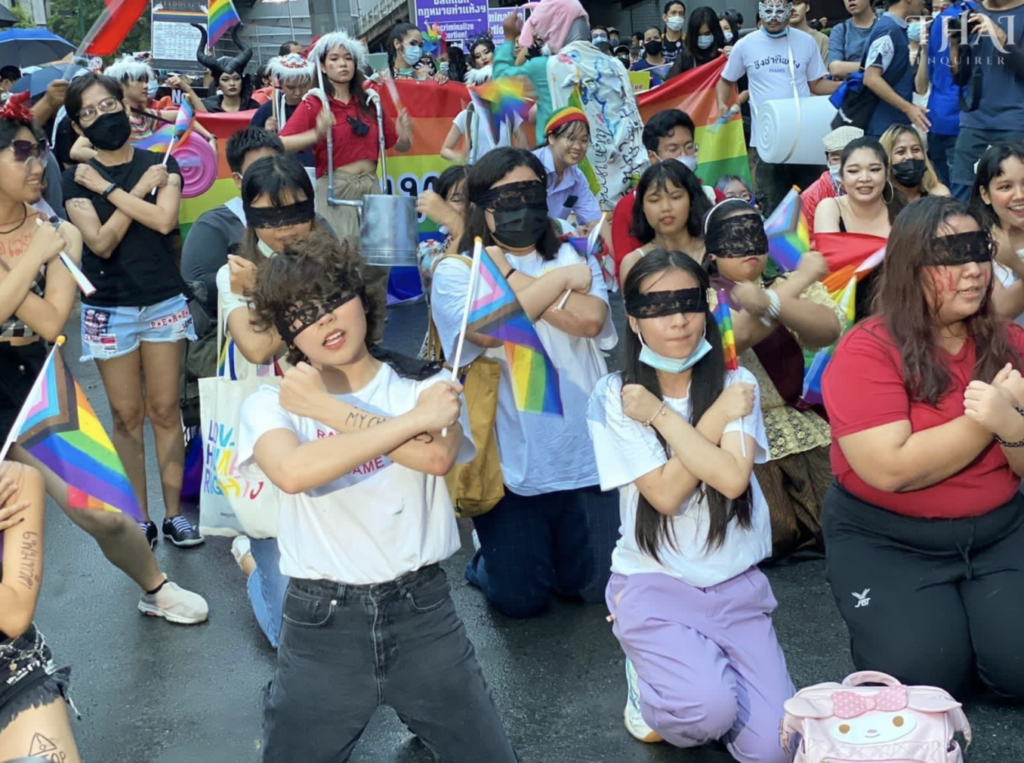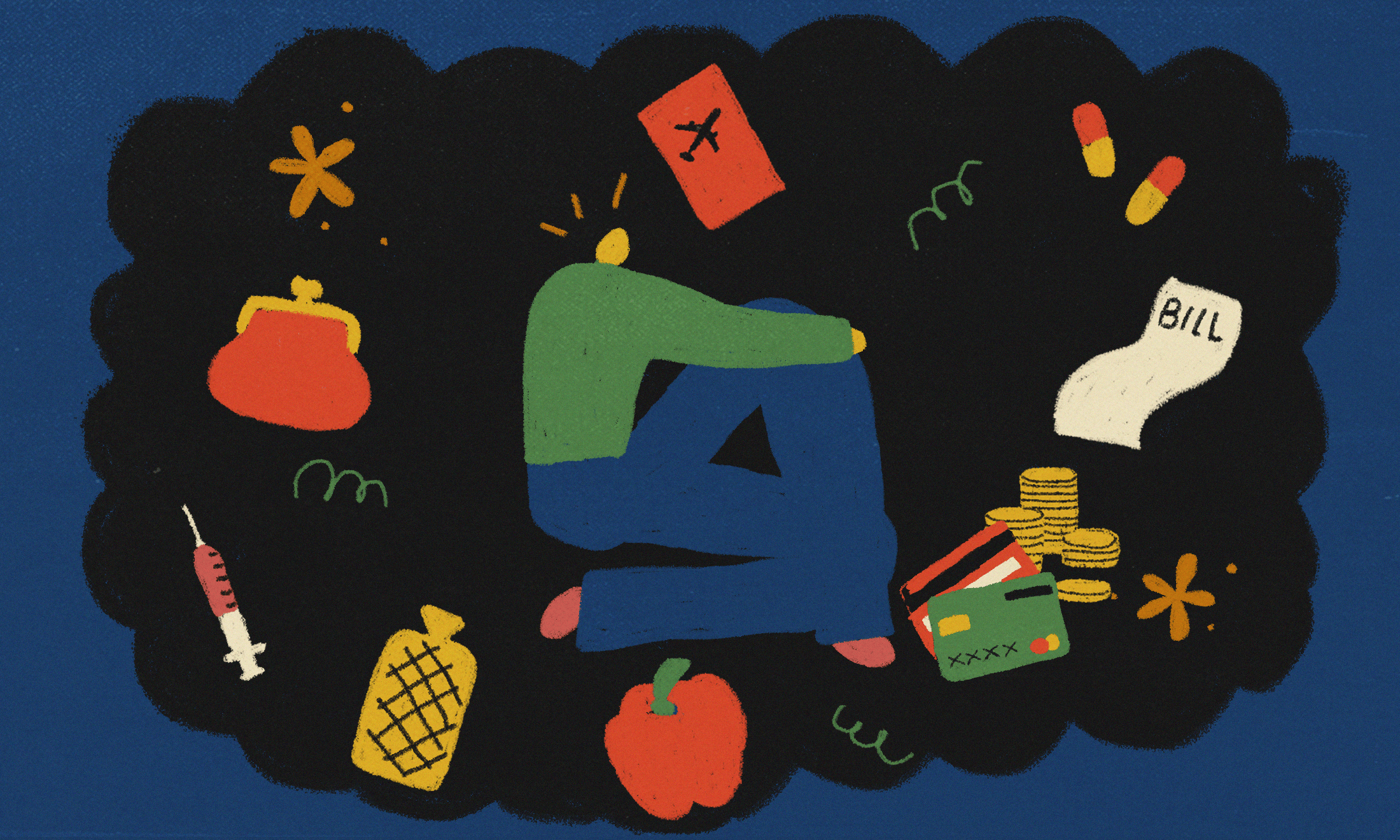
Pear Maneechote, Thai Enquirer
Young feminist and LGBTQI+ organisers are driving inclusion in Thailand’s growing pro-democracy movement
Amid a swelling pro-democracy movement in Thailand, its young activists are ensuring that marginalised groups don't get left behind.
Ani Hao
20 Nov 2020
Instead of focusing on her high school graduation, 18-year-old Yanisa Vararaksapong spent her remaining month at Triam Udom Suksa high school encouraging fellow students to join the pro-democracy movement rapidly growing across Thailand.
Right before her graduation in February 2020, Yanisa founded the Kiamudom Against Dictatorship group. She now leads six other members, all young women but one.
“Our first purpose was to organise a protest on the school campus to show our frustrations with the government, but afterwards we started to touch upon topics inside our school as well,” Yanisa explains. Now in her first year at Chulalongkorn University in Bangkok, Yanisa is looking to join new networks of activists on campus.
Rituals like graduation, finals, or starting at a new university were different for students in Thailand this year. The current wave of student-led movement of pro-democracy demonstrators began in early 2020 and has grown into the largest political mobilisation of Thai people in history.
Now numbering hundreds of thousands of activists, they continue to call for three core demands: for the ruling Prayut Chan-o-cha government and the Palang Pracharath Party to resign, the government to re-draft the military-backed charter and the government to stop harassing dissidents. Prime Minister Prayut Chan-o-cha is a former general who led Thailand’s 12th military coup in 2014, was elected by the parliament as Prime Minister in 2019 and has ruled with absolute power until today. Many view the constitution and elections created by this government borne from the 2019 indirect elections as illegitimate.
However, the most controversial aspect of this new round of student-led protests against the government is its widespread, unprecedented critique of the Thai monarchy’s concentration of power and perpetuation of inequality. Thailand’s lèse majesté law dates back to 1904 and was created to protect the monarchy, which ruled with absolute power before a 1932 revolution. This law, still in place today, criminalises any criticism, defamation or insult of the monarchy but does not clearly define what these acts are, exactly. Lèse majesté carries a minimum sentence of three years’ imprisonment and has been increasingly cited as grounds for prosecution.
Since the 2014 military coup, more than 90 people have been prosecuted under the lèse majesté law, many of them pro-democracy demonstrators. Young Thais are criticizing the monarchy in a way that is extraordinary in scale, given the harsh penalties and state-sponsored program of public adoration of the monarchy.
A battle for inclusivity
Within the pro-democracy movement, young women have emerged as a political force with their widespread participation. “Women are increasingly speaking out against a patriarchy that has long controlled the military, the monarchy, and the Buddhist monkhood, Thailand’s most powerful institutions,” write Hannah Beech and Muktita Suhartono.
“Recently, there was this campaign that collected signatures to call for a constitutional amendment and there were more than 100,000 people who signed up and more than 60% of them were women,” Yanisa says. “A lot of the participants are women and LGBTQ people and a lot of the organisers are women. I think part of the reason is because we are oppressed in some ways – that’s why more of us come out against [oppressive governments].”
As a self-identified intersectional feminist, Yanisa highlights the specific contributions that young feminist and LGBTQI+ activists have been making. “You can see that there are feminists, socialists, and those people [all active in this pro-democracy movement], and especially on the gender equality issue, within the community, there is quite a consensus of what we are asking for. There is [the legalisation] of sex work, [the legalisation of] abortion, and marriage equality. These are, I think, the major concerns.”
Yanisa is referring to the feminist and LGBTQI+-led campaigns to legalise sex work, abortion and reform the law to permit marriage between all genders. Young feminist and LGBTQI+ activists are making their voices heard in the pro-democracy movement, insisting that their demands for society to respect the rights of minorities align with the campaign to ensure greater democracy in Thailand.
Many people both outside of Thailand and within the country believe that the country enjoys relatively progressive gender equality and a vibrant LGBTQI+ scene. But systemic discrimination continue for women, LGBTQI+ individuals, sex workers and other marginalised groups, who often intersect.
“I’m trying to push for a more inclusive democracy, where we pay attention to marginalised people in society, such as working class people, sex workers and [minority] ethnic groups in Thailand. These are the people overlooked in the Thai mainstream pro-democracy movement”
“A lot of people in Thailand know that we should have had the marriage equality law for some time. In Thailand, there are two movements from different groups of activists. One group wants to start with same-sex civil partnership – they want to create a new law,” explains Chitsanupong “Best” Nithiwana, a 25-year-old trans woman, activist, and founder of the Young Pride Club in Chiang Mai.
“Another group wants to change the existing law into a more inclusive law, where all genders can marry. The second group has become more famous since they started a hashtag around marriage equality. It’s gained a lot of connection and help from other countries, especially #MilkTeaAlliance supporters, some of whom come from Taiwan [the first country in Asia Pacific to legalise same-sex marriage]”.
Chitsanupong is specifically campaigning at her university for the acceptance of trans identities within the institution’s rigid gender norms. “We are trying to call for gender recognition in university,” she says. “Some universities won’t allow [people majoring in medicine or law] to wear costumes that don’t match your [assigned] gender identity – if you are trying to be a doctor or lawyer, for example. We are also collaborating with the [movement] for marriage equality in Thailand”.
Sex worker-led advocacy and rights are also on the agenda. Pinsuda “Pin” Sorussa, a 23-year-old political sciences student at Chulalongkorn University, has been collecting signatures for a petition to legalise sex work spearheaded by Empower Foundation, a center for sex workers’ education and support that works across Thailand.
“From what I have seen, people from my generation have been more supportive [of these issues] than the older generation,” says Pinsuda. “I’m trying to push for a more inclusive kind of democracy, where we also pay attention to the marginalised people in society, such as working-class people, sex workers and [minority] ethnic groups in Thailand. These are the people I think are overlooked in the Thai mainstream pro-democracy movement.”
An internal struggle
While LGBTQI+ activists and feminists are breaking taboos around topics like sex work, abortion, and LGBTQI+ rights, not everyone thinks that these demands should be in the context of the pro-democracy movement. The activists disagree.
“Most of the arguments against feminist movements are that ‘Oh, we have to fight for democracy first,” says Yanisa. “Our [counter] argument is that we have to fight for everyone. If mainstream pro-democracy movements become more inclusive and not just generalised groups, it becomes ideal. There is sexism within pro-democracy protests. There are groups of people being denied, not being listened to because of their gender and [other factors].”
Sexism is a feature of different pro-democracy movements because these movements reflect the same power structures and social dynamics as within larger society. In Hong Kong, a place whose pro-democracy movement greatly inspired and directly exchanged tactics with pro-democracy activists in Thailand, women who were active in the pro-democracy movement, either as journalists or on the frontlines, faced misogyny, sexual assault and more, culminating in a parallel movement called #ProtestToo.
#ProtestToo didn’t symbolise the strength of Hong Kong’s feminist movement but rather its lack of a broader understanding of gender inequality, amongst other issues. Jessie Lau, a writer and journalist from Hong Kong and the online editor in chief of Nüvoices, writes that Hong Kong is still waiting for its feminist uprising: “Freedom of speech in Hong Kong has enabled the city’s feminist groups and LGBTQI+ activists to organize on a variety of issues—but those groups have rarely been able to integrate their concerns into wider campaigns such as the pro-democracy movement, where their concerns are routinely dismissed”. Feminist scholars such as Professor Petula Sik, looking at the broad Hong Kong pro-democracy movement discourse, found a lack of a strong feminist lens and agenda.
In Thailand, young feminists and LGBTQI+ activists are determined to make the pro-democracy movement an inclusive space. On 7 November, LGBTQI+ activists organized a Pride march in Bangkok in alliance with the on-going pro-democracy campaign. Demonstrators donned rainbow flags, colourful outfits, signs that advocated for the decriminalisation of sex work and abortion, and danced in groups to the sounds of Blackpink, Lady Gaga and Cardi B throughout the day.

“It’s a wordplay actually. ‘Pride’ sounds like ไพร่ in Thai which means “the common people,” explains Pinsuda, who was present at Pride. “This is the first time we really have a Pride Parade that is to protest [with anti-government demonstrators] and make our voices heard. Many people have said they feel much safer and feel like they can be themselves without being judged in the Pride Parade,” says Pinsuda. The work of these young activists is “unprecedented”, says Pear Maneechote, reporter and digital content manager at Thai Enquirer. She reported live from the Pride Parade.
“As a reporter and, most importantly, a young, Thai woman who advocates for equality, freedom of speech, and democracy, I have been incredibly moved and inspired by the current movement as it also demands equal rights for marginalised communities and those overlooked by the status quo. This sort of display and advocacy has been unprecedented.”
“The [pro-democracy] movement is currently dominated by male activists. Sure, they critique the monarchy and its tax spending but they also speak of the kings’ wives as if they are merely objects. We are not ‘separating people’s forces and making it weaker by not presenting as a united front’ – [we are] giving space and amplifying the voices of those who are ignored, both by the state, and the male-dominated movement. Everyone’s voices should be listened to. That’s democracy,” says Pin.
On 18 November 2020, Thailand’s cabinet approved an amendment of the current legislation on abortion, allowing women to seek and have abortions up to 12 weeks into their pregnancy. Undoubtedly, recent feminist-led campaigning for the legalisation of abortion contributed to this victory. Feminist activists celebrated over Twitter but remain undeterred from their activism and continue to be critical of the ruling government, monarchy, and elite.
Thailand’s rulers have been served with their notice; they can now either choose to meet the core demands of activists or continue to respond with repression and violence. Either way, the impact of this youth movement will outlast them, thanks to the young feminist and LGBTQ activists who are not only fighting for democratic reforms but a more just and inclusive society for all.

Britain’s policing was built on racism. Abolition is unavoidable

How Pakistan’s Khwaja Sira and transgender communities are fearing and fighting for their futures

Their anti-rape performance went viral globally. Now what?




